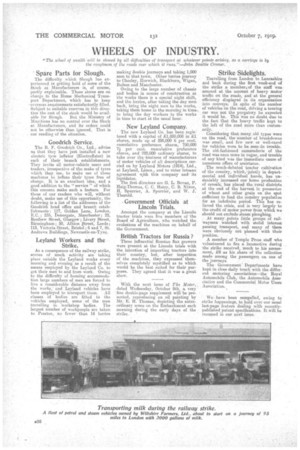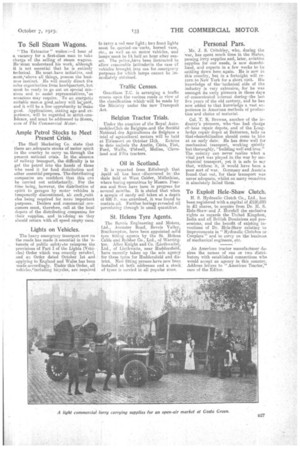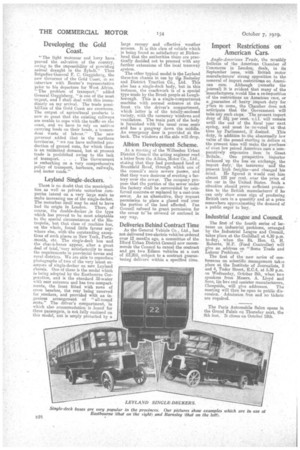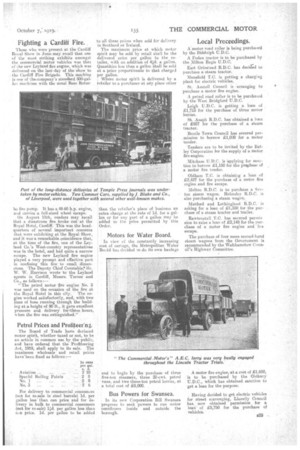WHEELS OF INDUSTRY.
Page 4

Page 5

Page 6

Page 7

If you've noticed an error in this article please click here to report it so we can fix it.
The wheel of wealth will be slowed by all difficulties of transport at whatever points arising, as a carrie.ge is by the roughness, of the roads over which it runs."—John Beattie Crozier.
' Spare Parts for Slough.
The difficulty which Slough has experienced in getting hold of some of the Stock at .Mannfactnrers is, of course, partly explainable. These stores are on charge to the Home Mechanical Transport, Department, which has to keep overseas requirements satisfactorily filled. Subject to suitable reserves in this direction the rest of the stock would be avail able fur Slough. But the Ministry of Munitions has no control over the Stock at Manufacturers, aiid its orders could not be otherwise than ignored. That is our reading of the situation.
Goodrich Service.
The B. F. Goodrich Co., Ltd., advise us that they have just installed a new electric tyre inflator (Electroflator) in each of their branch establishments. They invite all motor-vehicle users and traders, irrespective of the make of tyres which they use, to make use of these machines to inflate their tyres free of °barge. it ii an excellent idea.; and a, good addition ta the " service " of which this concern make atich a. feature. For those of our readers who will, without doubt, make use of this opportunity, the following is a list of the addresses of the Goodrieh head office and branch establishments : 117, Golden Lane, London, ; 235, Dearisgate, Manchester; 22, Renfrew Street, Glasgow ; Livery Street, Birmingham.; 50, Albion street, Leeds; 118, Victoria Street, Bristol; 6 and 7, St. Andrews Buildings, Newcastle-on-Tyne.
Leyland Workers and the Strike.
As a consequence of the railway strike, scenes of much activity are taking place outside the Leyland works every morning and evening as a result of the means employed by the Leyland Co. to get their men to and from work. Owing to the difficulty of housing accommodation large numbers of men are forced to live a considerable distance away from the works; and Leyland vehicles have been employed to transport them. All classes of bodies are fitted to the vehicles employed, some of the men travelling 'in workshop bodies. The largest number of workpeople are ta-ken to Preston, no fewer than 14 lorries making double journeys and taking 1,000 men to that town. Other lorries journey to Chorley, Horwich, Blackburn, Wigan, Bolton and Manchester.
Owing to the large number of chassis and bodies in course of construction at the works there is a special night shift, and the lorries, after taking the day men back, bring the night men to the works, taking them home in the morning in time-.., to bring the day workers to the works in time to start at the usual hour.
New Leyland Company.
The new Leyland Co. has been registered with a capital of L1,850,000 hi Ll. shares, madeup of 200,000 6 per cent. cumulative preference shares, 750,000 7-i per cent, cumulative preference shares, and l'00,000 ordinary shares, to take over the .business of manufacturers of motor vehicles of all descriptions carried on by Leyland Motors t1914), Ltd., at Leyland, Lancs., and to enter intobart agreement with this company andits liquidator.
The first directors are G: L. Bevan, P. Haig-Thomas, C. C. Hatry, C. B. Nixon, H. Spurrier, A. Spurrier, and W. J. Thorold.
Government Officials at Lincoln Trials.
Amongst the company at the Lincoln tractor trials were five members of the Board of Agriculture, who watched the evolutions of the machines on behalf of the Government.
British Tractors for Russia ?
Three influential Russian flax growers were present at the Lincoln trials with the intention of importing tractors into their country, but, after inspection of the machines, they expressed themselves completely mystified as to which would be the best suited for their purposes. They agreed that it was a great show.
With the next issue of The Motor,, dated Wednesday, October 8th, a. very fine double-page supplement will he presented, reproducing an oil painting by Mr. E. H. Thomas, depicting the extraordinary scene on the Embankment each morning during the early 'days of the strike.
Strike Sidelights.
TraVelling from London to Lancashire and back during the first week-end of the strike a memberi of the meli wasamazed at the amount of heavy motor. traffic on the roads, and at the general efficiency displayed in its organization into convoys. In spite of the number of vehicles on the road, driving a. touring car was not the purgatory he expected it would be. This was no doubt due to the fact that the heavy traffic kept to the left of the road more than customarily.
Considering that many .old types were on the road, the number of breakdowns was small, and few new or well-cared for vehicles were to be seen-fm trouble. The old-fashioned camaraderie of the road was once more in vogue, and trouble of any kind was the immediate cause of numerous offers of assistance.
The much-debated tractor cultivation of the country:, which;rjointly in departmental and individual hands, has undeniably increased our home production of cereals, has placed the rural distriets at the end of the harvest in possession of wheat and other grain on the spot sufficient to feed the comitry population for an indefinite period. This has relieved the crisis, and is very largely to the credit of motor power from which we shonld not exclude steam ploughing. At many .points little groups of railwaymen watched with stolid interest passing transport, and many of them were obviously not pleased with their position.
A member of Temple Press staff who volunteered to fire a locomotive during the strike received, much to his amusement, £8 as his share of the collection made among the passengers on one of the journeys
The Government Departments have kept in Close daily touch with the different motoring associations—the Royal Automobile Club, the Automobile Asso cia.tion and the Commercial Motor -Users Association..
We have been compelled, owing to strike happenings, to hold over our usual last-page feature dealing with recentlypublished patent specifications. It will bo resumed in our next issue.
To Sell Steam Wagons.
"The Extractor" writes :—I hear of a vacancy for a first-class man to take charge of the selling of steam wagons. He'inuat understand his work, although it is not essential that he is entirely
technical.. He must-have initiative, and niutt,.above all things, possess the business instinct. He will mostly direct the sales organization from headquarters-, but must be ready. to go out on special missions and. to assist representatives,1 as occasions may require. To an energetic suitable mama good,salary will bcpaid, and it will be a fine opportunity to make good. Applications, stating age-and experience, will be regarded in strict.confidence, and must be addressed to Steam, care of The Commercial Motor.
Ample Petrol Stocks to Meet Present Crisis.
The Shell Marketing Co. state that there arc adequate stocks of motor spirit in the country to carry its, through the present national crisis. In the absence of railway transport, the difficulty is to get the petrol into the handa of those who need it for food distribution and other essential purposes. The distributing companies are confident that this can he carried out satisfactorily. For the firm being, however, the distribution of spirit to garages by motor vehicles is temporarily 'discontinued, all such cies being required for, more important purposes. Dealers and. commercial .consinners must, therefore, call at the local depots of the distributing companies for their supplies, and in"idoing so they should return with all speed empty cans.
Lights on Vehicles.
The heavy emergency transport now On the roads has made it essential in the 'nterests of public safety.to reimpose the provisions of Part I of the Lights (Vehicles) Order which waarecently revokel, and an Order dated October 1st and applying to England and Wales has been made accordingly. Under this Order, all yehicles,^'including bicycles, are required
to harry a red rear light; two front lights must be carried on 'carts, horsed vans, etc., as well as,on motor vehicles, and lamps mustbe lit half an hour after sunset. The police,have been instructed to allow reasonable latitudetin the case -ef vehicles brought into use for emergency purposes fee which lamps cannot be immediately obtained.
Traffic Census.
Grantham T.C. is arranging a traffic census upon the various roads in view of the classification which,wili be made by the Ministry under the new Transport Act,
• Belgian Tractor Trials.
Under the auspices of the Royal Automobile1Club de Belgique,and the Societe National des Agriculteurs de Belgique a trial of agricultural motors will he held at Tirlernont on October 111h. Entries to date include the Austin, Ceres, Fiat, Ford, Wallis, Tidwell, Moline, Cleveland and Filtz tractors.
Oil in Scotland.
It is -reported from Edinburgh that iquid oil has been discovered in--. the shale field at West Calder, Midlothian, where boring operations by Messrs. Pearson and Sons have been in progress for several months. It is stated that when a sample of sandy soil taken at a depth of 600 ft. was examined, it was found to contain. oil, Further borings revealed oil percolating through in small quantities.
St. Helens Tyre Agents.
• The Bevois Engineering and Motors, Ltd., ncaster Road, Bevels Valley, Southampton, have been appointed solid tyro fitting .agents by the St. Helens Cable and Rubber Co., Ltd., of Warrington: Allen Knight and Co. (Linthwaite), Ltd., of Linthwaite, near Huddersfield, have recently taken up the sole agency for these tyres for Huddersfield and district. New fitting presses have now been installed at both addresses and a stock_ of tyres is carried in all popular sizes.
Personal Pars.
Mr. J. S. Critchley, who, during the war, has spent much time in the States, passing lorry supplies and, later, aviation supplies for our needs, is now demobilized., and expects in a few weeks to be settling down here again. He is now in this country, but in a fortnight will -return.to New York for a short visit. His knowledge of the^technical side of the industry is very extensive,. for he was amongst its early pioneers in those days of concentrated interest during k the. last five years of the old century, and he has now added to that knowledge a vast. experience in American methods of production'and choice of material.
Col. T. B., Browne, another of the industry's pioneers, who -has had charge Cf. base repair depots, and of the Longhedge repair depot. at Battersea, tells us thatrdemobilization should come to him at an early date: He has done well for mechanical transport, working quietly but thoroughly, "building well and trne." The cotintry can never realize what a vital part was played in the war by mechanical transport, yet it is safe to say that, without it, it would have been a poor sort of war. Germany and Austria found that out, for their transport was never adequate, whilst on many occasions it absolutely failed them,
To Exploit Hele-Shaw Clutch.
H. S. Hydraulic Clutch Co., Ltd., has been registered with a capital of 2150,000 in 21 Shares, to acquire from Dr. IL S. Hele-Shaw -and J. Horsfall the exclusive rights as regards the United Kingdom, India and all British Dominions and possessions, and the benefit of existing inventions of Dr. Hele-Shaw relating to improvements in "Hydraulic Clutches or Couplers " and to carry on the business, of mechanical engineers, etc.
An American tractor manufacturer desires the names of one or two distributers with established connections who wriuld accept an agency in this country. Address letters to American Tractor," care of the Editor.
Developing the Gold Coast.
"The light motorcar and lorry have proved the salvation of the country, owing to the impossibility of providing animal draught in the fiybelt. ' Thus Brigadier-General F. C. Guggisbere, the new Governor of the Gold Coast, in an interview with Renter's representative prior to his departure for West Africa. "The problem of transport,' added General Guggisberg, "is one of the most urgent, and I shall deal with this immediately on my arrival. The trade possibilities of the Gold Coast are enormous. The output of agricultural products is now so great that the existing railways are unable to cope with the traffic on the coast, and we have to rely on natives carrying loads on their heads, a: treanenclous waste of labour." The new governor .added that M the northern territories, we can have unlimited production of ground nuts, for which there is an unlimited demand? but at present trade is prohibited oweeg to the lack of transport. . . . The Government is embarking on a very comprehensive policy of transport, harbours, railwaYes, and motor roads."
Leyland Single-deckers.
There is no doubt that the municipalities as well as private motorbus companies intend on. a. very large scale to make increasing use of the single-decker. The motorbus itself may be said to have had its origin in London. There, of course, the double-decker the type
which has proved to be most adaptable to the special circum.stances of the Metropolis, but that class of machine has, on the whole, found little favour anywhere else, with sthe outstanding exceptions of such places as New York, Portemouth, etc. The single-deck bus and the char-a-banes appear, after a great deal of trial,'very satisfactorily to meet the requirements in provincial towns and rural districts. We are able to reproduce photographs of two of the very latest examples of single-decker on new Leyland chassis. One of these is the model which is being adopted by the Eastbourne CorPeration, and is the standard 32-seater with rear entrance and has two compartments' the front fitted with rows of cross benches, the rear being reserved for smokers, and provided with an ingenious arrangement ,of "all-round seats." The driver's compartment, in which also accommodation is found for three passengers, is not fully enclosed on this model, out is amply protected by a
large canopy and effective weather screens. It is this class of vehicle which is being found so satisfactory at Birkenhead that the authorities there are practically decided not to proceed with any further extensions of the local tramway system.
The other typical model is the Leyland three-ton chassis in use by tlw Barnsley and District Traction Co., Ltd. This also has a single-deck body, but in this instance, the coachwork is of a special type made by the Brush people at Loughborough. This is a single-compartment machine with normal entrance at the front via the driver's .conapartarient, which latter is of the totally-enclosed variety, with the necessary windows and ventilators. The main part of the body is furnished with-the usual cross seats and has a gangway down the middle. An emergency door is provided at the hack. The windows at the side will drop.
Albion Development Scheme.
At a meeting of the Willesden Urban District. Couneil the acting engineer read a letter from the Albion, Motor Co., Ltd., steting that they had purchased land at Brentfield Road, through which one of the council's main sewers passes, and that they were desirous of erecting a factory over the sewer. The company propose that the portion of the sewer under the factory shall be surromided by reinforced concrete or replaced by a cast-iron sewer. As an alternative, they request permission to place a glazed roof over the portion of the land affected. file Council refused to grant permission for the sewer to–be ccivered or enclosed in any way.
Deliveries Behind Contract Time
As the General Vehicle Co. LW., has not delivered two electric vehicles ordered over 12 months ago, a committee of the Ilford Urban District Council now recommends the Council to cancel the contract and get two Edison vehicles at a cost of 23,208, subject to a contract guaranteeing delivery within a specified time.
Import Restrictions on. American Cars.
Anglo-American Trade, the monthly bulletin of the American Chamber of Commerce in London, deals, in its September issue, with British motor manufacturers' strong opposition to the removal of import restrictiotes on American cars. Although (remarks the journal) it is evident that many of the manufacturers would like a re-imposition of the restrictions on American oars, or a _guarantee of heavy .import duty for years to come, the Chamber . does not anticipate that the 'Government will take any such steps. The present import duty of 33e per cent. c.i.f. will remain until the end of the fiscal year next spring, and must be re-voted at that
time by Parliament, if desired. This duty, in addition to the abnormally low value of the pound sterling in dollars at the present time will make the purchase of even low priced American cars a comparatively expensive item in Great Britain. One prospective importer reckoned up the loss on exchange, the import duty, the insurance nail the present high freights—and changed'his mind. He figured it would cost him almost 100 per cent, over the price of the ear in the United States. Such a situation should prove sufficient protection to the British manufacturer if he can only show some sign of producing British cars in a quantity and at a price somewhere approximating the demand of a public eager to buy.
Industrial League and Council.
The first of the fourth series of lec tures on industrial problems, arranged by the Industrial League and Council, takes place at the Guildhall at 4.30 p.m. to-day, when the Rt. Hon. G. H. Roberts, M.P. (Food Controller) will give an address on "Some Trade and Labour Problems."
The first of the new series of con
ferences on scientific management takes place at the Institute of Journalists, 2 and 4, Tudor Street, E.C.4, at 5.30 p.m. on Wednesday, October 8th, when two speakers from Messrs. A. Lloyd and Sons, tin hoe and canister manufacturers,
Cheapside, will give addresses. The meeting will then be open to public discussion. Admission free and no tickets are required.
. — The Paris Automobile Salon opens in the Grand Palais co Thursday next, the 9th inst. It closes on October 19th.
Fighting a Cardiff Fire..
Those who were present at the Cardiff Royal-Show in June:may recall that one of the most striking exhibits amongst the commercial motor vehicles was that of the new Leyland fire engine, which was delivered on the last,da-Y of the show to
• the Cardiff Fire Brigade. This machine • is one of thescompany's standard 500-gallon Machines with the Usual Rees Rotur bo fire pump. It has a 48-60 h.p. engine, and carries a full-sized wheel escape.
On August 11th, readers may recall that a disastrous fire broke out at the Royal Hotel, Cardiff. This was the headquarters of several important concerns that were exhibiting at the Royal Show, and it was u remarkable coincidence that, at the time of the fire, one of the Leyland Co.'s West-country representatives was in the hotel, and had quite a narrow escape. The new Leyland fire engine played a, very prompt and effective part in confining this fire to small dimensions. --The Deputy Chief Constable'Mr. W. W. Harrison wrote to the Leyland agents in Cardiff, Messrs. Turner .and Co., as follows:— " The petrol motor -fire engine 'No. 2 was used on the occasion of the fire at the Royal Hotel in this city. The 'engine worked satisfactorily, and, with two lines of hose running through the building at a height of 90 ft., it gave excellent pressure and delivery for ithree hours, when the fire was extinguished."
Petrol Prices and Profiteer'ng.
The Board of Trade have declared motor spirit, whether taxed or not, to be an article in common use by the public, and have ordered that the Profiteering Act, 1919, shall apply to its sale. The maximum wholesale and retail prides have' been fixed as follows:— For delivery to. commercial consumers (not for re-sale in steel barrels) id. per gallon less' than can price and for delivery in bulk to commercial consumers (not for re-sale) 10. per gallon less than
price. Id. per gallon to be added
to all these prices when sold for delivery in Scotland OT Ireland.
The maximum price at which motor spirit may be sold by retail shall be the delivered price per gallon to the re' tailer, with an addition of 40. a _.e•allon. Quantities less than a gallon shall be sold at a price proportionate to that charged per gallon. Where motor spirit is delivered by a retailer to a purchaser at any place other than the retailer's place of business an extra charge at the rate of id. for a gallon or for any part of a gallon may be added to the price permitted by this Order.
Motors for Water Board.
In view of the constantly increasing cost of cartage, the Metropolitan Water Beil.cl has decided to.do its own haulage and to begin by the purchase of three five-ton steamers, three 20-cwt. petrol vans, and two three-ton petrol lorries, at • a total cost of .25,000.
Bus Powers for Swansea.
In its new Corporation Bill Swansea proposes to seek powers to run motor omnibuses inside and outside the borough.
Local Proceedings.
A motor road roller is being purchased by the Biddulph U.D.C.
A Foden tractor is to be purchased by the.,Milton Regis 'C.D.°.
East Grinstead R.D.C. has decided to purchase a steam tractor.
Mansfield T.C. is getting a charging plant for electric vehicles.
St. Austell Council is -arranging to purchase a motor fire engine.
A petrol road roller is to be purchased by the West Bridgford U.D.C.
Leigh U.D.C. is getting a loan of 21,715 for the purchase of three motor lorries.
St. Asaph R.D.C. has obtained a loan of 2957 for the purchase of a steam tractor.
Bootle Town Council has secured permission to borrow 21,000 for a motor tender.
Tenders are to be invited by the Batley Corporation for the supply of a motor fire-engine.
Mitcham U.D.C. is 'applying for sanction to borrow 21,150 for the purrhase of a motor fire tender.
Oldham T.C. is obtaining a lean of 22,427 for the purchase of a motor fire engine and fire escape.
Melton R.D.C. is to purchase a five. ton steam wagon. Helmsley -R.D.C. is also purchasing a steam wagon.
Mutford and Lothingland R.D.C. is asking for a loan of 21,350 for the purchase of a steam tractor and trailer.
Raivtenstall T.C. has secured perm's sion to raise a loan of 22,148 for the purchase of a motor fire engine and fire escape.
The purchase of four more second-hand steam wagons from the Government is recommended by the Walthamstow Council's Highway Committee.
A motor fire engine' at a cost of 21,600, is to be purchased by the Oldbury U.D.C., which has obtained sanction to get a loan for the purpose.
Having decided to get electric vehicles for street scavenging, Llanelly Council has now obtained permission for a loanof 25,750 for the purchase of vehicles.
























